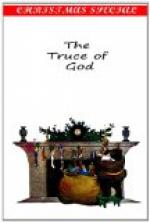For many centuries after the destruction of the Roman Empire, when all human institutions were swept away by the resistless torrent that poured from the North, and the Church of God alone stood safe and firm, with the rainbow of heaven around her, the stern warriors of Germany asserted their rights, or redressed their wrongs with the sword, and scorned to bow before the impotent decrees of a civil tribunal. A regular system of private warfare gradually sprang up, which falsely led every man of honor to revenge any real or fancied offence offered to any of his kindred. The most deadly enmity frequently existed between neighboring chiefs, and the bitter feeling was transmitted unimpaired from father to son. The most dreadful consequences inevitably resulted from this fatal installation of might in the outraged temple of justice. Until lately a blind prejudice and a perverted history have charged this unfortunate state of things to the pernicious influence of the Church of Rome. But the wiser Protestants of the present day, considering it rather a poor compliment to their faith to assign its birth to the sixteenth century, are beginning to be awake to the powerful instrumentality of the Christian Church in the regeneration of mankind, and the production of modern civilization. Few, indeed, even with the light of history, can form an adequate idea of the immensity of the task assigned to Christianity in shedding light over the chaos that followed the overthrow of Rome, in reducing it to order, and preparing the nicely fitted elements of modern Europe.
The Catholic Church beheld, and bitterly deplored, the evils of private warfare. Council after council fulminated its decrees against the pernicious system; men were exhorted by the sacred relics of the Saints to extinguish their animosities, and abstain from violence. But the custom had taken deep root; for, in the language of a well-known Protestant historian, “it flattered the pride of the nobles, and gratified their favorite passions.” But in the eleventh century the Church had gained a partial victory over the dearest appetites of the fiery Frank and the warlike Saxon. It was enacted, under pain of excommunication, that private warfare should cease from the sunset of Wednesday to the morning of Monday, and few were hardy enough to expose themselves to the penalty. The respite from hostilities which followed was called the “Truce of God.”
It was not the musical voice of the bell that made Gilbert de Hers pause on the very threshold of the struggle, and bite his lip until it grew white; but the sweet-toned bell announced the sunset of Wednesday. The young men stood gazing at each other, as though some spell had transformed them into stone. But the messenger of peace had stayed the uplifted sword, and, sheathing their unstained weapons, they knelt upon the green carpet beneath them, and put forth the same prayer to the same God.
It is a sight that may well command the eyes of Angels, when, though deaf to earthly laws and considerations, the angry heart, in the first heat of its wild career, still stops obedient to the voice of religion. Amid the dross of human frailty, the pure metal shines with the lustre that surrounds the sinner in the morning of his conversion.




